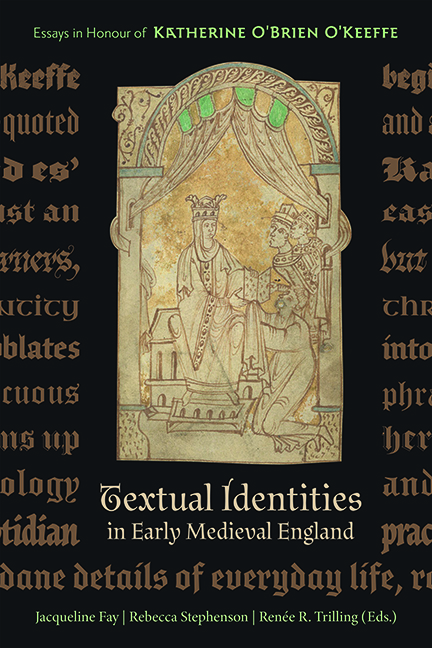Book contents
- Frontmatter
- Contents
- List of Illustrations
- List of Contributors
- Acknowledgments
- List of Abbreviations
- Introduction
- Part One Affect and Embodied Cognition in Medieval Didactic Texts
- Part Two Sovereignty, Power, and English Textual Identities
- Part Three Acts of Public Record in Making and Sustaining Communities
- Overview Of Career
- The Writings of Katherine O’Brien O’Keeffe
- Bibliography
- Index of Manuscripts
- General Index
- Tabula Gratulatoria
- Anglo-Saxon Studies
5 - Hawk Taming and Humanity in The Fortunes of Men
Published online by Cambridge University Press: 26 May 2022
- Frontmatter
- Contents
- List of Illustrations
- List of Contributors
- Acknowledgments
- List of Abbreviations
- Introduction
- Part One Affect and Embodied Cognition in Medieval Didactic Texts
- Part Two Sovereignty, Power, and English Textual Identities
- Part Three Acts of Public Record in Making and Sustaining Communities
- Overview Of Career
- The Writings of Katherine O’Brien O’Keeffe
- Bibliography
- Index of Manuscripts
- General Index
- Tabula Gratulatoria
- Anglo-Saxon Studies
Summary
To train a hawk you must watch it like a hawk… . Then you gain the ability to predict what it will do next… . Eventually you don't see the hawk's body language at all. You seem to feel what it feels. Notice what it notices. The hawk's apprehension becomes your own… . It was happening now. I had put myself in the hawk's wild mind to tame her, and as the days passed in the darkened room my humanity was burning away.
—H is for Hawk, Helen Macdonald (2014)MY EPIGRAPH, taken from Helen Macdonald's prize-winning memoir on hawk taming, captures the central concern of this essay: that close attention to birds and their behavior sheds light on the protean nature of ontological boundaries. As Macdonald immerses herself in the rhythms of hawk life in order to tame the wild goshawk Mabel – a quest propelled by the hope that ditching her humanity will also free her from the grief occasioned by her father's sudden death – she gains insight into the limitations of being human as well as a glimpse of the world through a new ontological lens. At once a biography of the deeply troubled novelist T. H. White, best known for his Arthurian novel The Once and Future King, and an elegy for her father's passing, Macdonald's account of a year spent losing a father and finding a hawk underscores the fine line between the human and the nonhuman animal world, as well as the processes of taming and socialization that serve to maintain or, conversely, to bridge this divide.
H is for Hawk is set partly in Cambridge, the home of Macdonald, and partly in Scotland, the home of her newly acquired goshawk, Mabel. My essay revisits bird life in Britain while taking us back in time to a body of literature similarly fascinated by the boundaries of humanity, yet composed over a millennium before Macdonald set out to soften the edges of both her goshawk and her grief. More specifically, my essay investigates representations of avian life in the ninety-eight-line Old English wisdom poem known variously as The Fortunes of Men, The Fates of Men, and The Fates of Mortals, and preserved in the late tenth-century Exeter Book.
- Type
- Chapter
- Information
- Textual Identities in Early Medieval EnglandEssays in Honour of Katherine O'Brien O'Keeffe, pp. 107 - 132Publisher: Boydell & BrewerPrint publication year: 2022



